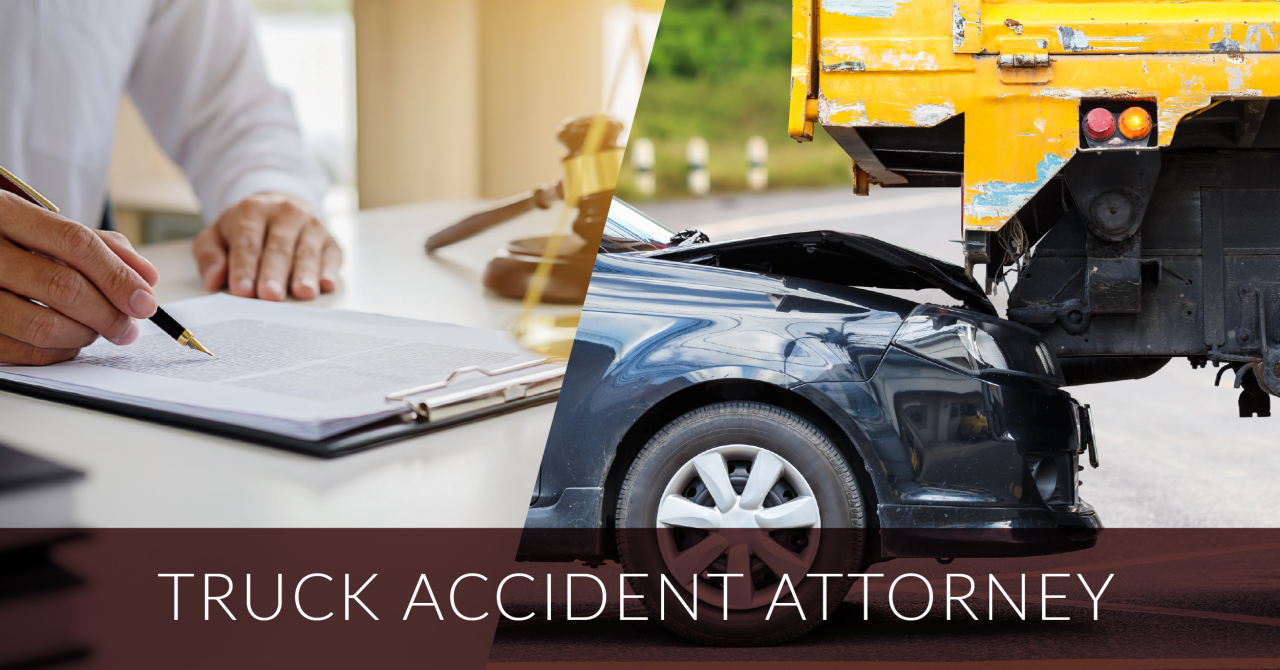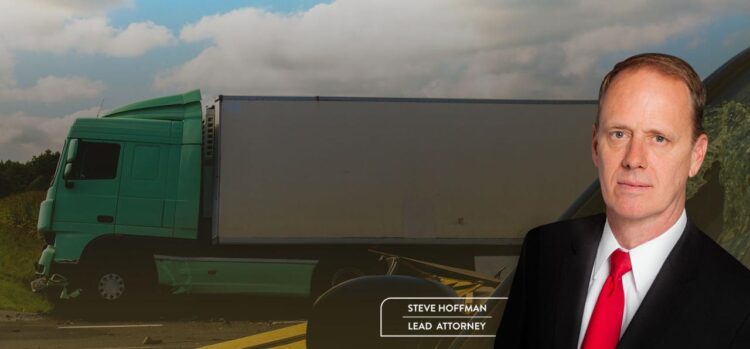
Types of Trucking Accidents
Trucking accidents can be devastating, causing serious injuries or even death. There are many different types of trucking accidents, each with its own unique challenges and complexities.
Rollover Accidents
Rollover accidents are one of the most common types of trucking accidents. They occur when a truck loses control and rolls over onto its side or roof. Rollover accidents can be caused by a variety of factors, including:
- Speeding
- Improper loading
- Driver fatigue
- Mechanical failure
Jackknife Accidents
Jackknife accidents occur when a truck’s trailer swings out to the side, forming a 90-degree angle with the cab. Jackknife accidents can be caused by a variety of factors, including:
- Sudden braking
- Slick roads
- Driver error
Rear-End Collisions
Rear-end collisions are another common type of trucking accident. They occur when a truck rear-ends another vehicle. Rear-end collisions can be caused by a variety of factors, including:
- Driver distraction
- Tailgating
- Improper following distance
Common Causes of Trucking Accidents
Trucking accidents are a significant concern due to their potential for severe injuries or fatalities. Understanding the common causes of these accidents is crucial for preventing them and ensuring the safety of both truck drivers and other road users.
Various factors contribute to trucking accidents, including driver-related issues, vehicle-related issues, and environmental factors. Driver fatigue, speeding, and distracted driving are among the most prevalent driver-related causes.
Driver Fatigue
- Long hours of service: Federal regulations limit the number of hours truck drivers can drive without rest. However, drivers may exceed these limits to meet tight deadlines or earn more money.
- Insufficient rest: Drivers may not get adequate sleep due to demanding schedules, irregular sleep patterns, or personal factors.
- Poor sleep quality: Even when drivers get enough sleep, it may not be restful due to factors such as noise, vibration, or uncomfortable sleeping conditions in the truck cab.
Legal Considerations for Trucking Accident Victims

Victims of trucking accidents have specific legal rights and options to pursue compensation for their injuries and damages. Understanding these considerations can empower you to make informed decisions and navigate the legal process effectively.
Filing a personal injury claim allows victims to seek financial compensation for medical expenses, lost wages, pain and suffering, and other damages caused by the accident. It is essential to gather evidence, such as medical records, witness statements, and accident reports, to support your claim.
Specific Laws and Regulations
Trucking accidents are governed by federal and state laws and regulations, including:
- Federal Motor Carrier Safety Regulations (FMCSR)
- Commercial Driver’s License (CDL) requirements
- Hours of Service (HOS) regulations
- State laws on negligence, liability, and insurance coverage
These laws establish standards for driver qualifications, vehicle maintenance, and operating practices to prevent accidents and protect public safety. Victims of trucking accidents can hold responsible parties accountable for violations of these regulations that contribute to the accident.
Pursuing Legal Action
In some cases, legal action may be necessary to pursue compensation and hold responsible parties accountable. This may involve filing a lawsuit against the trucking company, driver, or other negligent parties. An experienced trucking accident attorney can guide you through the legal process, negotiate with insurance companies, and advocate for your rights.
Choosing a Trucking Accident Lawyer

When you’ve been involved in a trucking accident, choosing the right lawyer can make all the difference in the outcome of your case. Here are some key factors to consider:
- Experience and specialization: Look for a lawyer who has extensive experience handling trucking accident cases. They should be familiar with the unique laws and regulations that apply to these cases and have a proven track record of success.
- Reputation: Research the lawyer’s reputation among their peers and clients. Read online reviews and talk to other attorneys to get a sense of their credibility and effectiveness.
- Communication and responsiveness: Choose a lawyer who is easy to communicate with and responsive to your needs. They should keep you informed about your case and be available to answer your questions promptly.
- Contingency fee: Many trucking accident lawyers work on a contingency fee basis, which means you don’t pay any fees unless they win your case. This can be a good option if you’re facing financial challenges.
- Personality fit: It’s important to choose a lawyer who you feel comfortable with and who you believe will represent your interests effectively. Trust your instincts and find a lawyer who you can work with well.
Tips for finding a reputable and qualified trucking accident lawyer:
- Ask for referrals from friends, family, or other professionals.
- Search online directories and read reviews from past clients.
- Attend a free consultation to meet with potential lawyers and ask questions.
- Check with your state bar association for a list of qualified attorneys.
- Interview several lawyers before making a decision.
By following these tips, you can increase your chances of finding a trucking accident lawyer who will help you get the compensation you deserve.
The Role of Insurance in Trucking Accidents

Insurance plays a crucial role in the aftermath of trucking accidents, providing financial protection for both victims and liable parties. Understanding the various types of insurance coverage available and the process of filing and negotiating claims is essential for maximizing compensation and safeguarding your rights.
Truckers are required by federal law to carry a minimum amount of liability insurance, which covers damages caused to others in an accident. This includes:
- Bodily injury liability (BIL): Covers injuries sustained by victims in the accident.
- Property damage liability (PDL): Covers damage to vehicles, property, and infrastructure.
Additional types of insurance coverage that may be available include:
- Cargo insurance: Covers the value of the goods being transported in the event of damage or loss.
- Uninsured/underinsured motorist coverage (UM/UIM): Provides coverage if the at-fault driver is uninsured or underinsured.
- Medical payments coverage (MedPay): Covers medical expenses for the driver and passengers, regardless of fault.
Filing an Insurance Claim
To file an insurance claim, you should contact the insurance company of the at-fault driver as soon as possible. You will need to provide the following information:
- Details of the accident, including the date, time, and location.
- Names and contact information of all parties involved.
- Description of the injuries and damages sustained.
- Copies of any relevant documentation, such as police reports and medical records.
Negotiating with Insurance Companies
Insurance companies are profit-driven organizations that will try to minimize their payouts. It is important to be prepared to negotiate and advocate for your rights. Consider the following tips:
- Document your damages and expenses thoroughly.
- Be realistic in your settlement demands, but do not undervalue your claim.
- Consider consulting with an attorney if you are having difficulty negotiating a fair settlement.
Remember, the goal of the insurance process is to provide fair compensation for the damages and losses you have suffered as a result of the trucking accident. By understanding your rights and the role of insurance, you can protect your interests and maximize your recovery.
Preventing Trucking Accidents
Preventing trucking accidents requires a comprehensive approach involving various stakeholders, including drivers, trucking companies, government agencies, and technology providers. By implementing effective measures, such as driver training, vehicle maintenance, and regulatory enforcement, we can significantly reduce the frequency and severity of these accidents.
Driver Training and Education
Proper training and education are crucial for preventing trucking accidents. Drivers should undergo comprehensive training programs that cover safe driving practices, defensive driving techniques, and accident prevention strategies. Regular refresher courses and ongoing professional development are also essential to ensure that drivers stay up-to-date with the latest industry standards and best practices.
Vehicle Maintenance and Inspections
Well-maintained vehicles are less likely to be involved in accidents. Trucking companies must establish and adhere to rigorous maintenance schedules, including regular inspections, repairs, and replacements of worn or damaged parts. Drivers should also conduct pre-trip inspections to identify any potential mechanical issues before starting their journey.
Regulatory Enforcement
Government agencies play a vital role in preventing trucking accidents by enforcing regulations and ensuring compliance. They should conduct regular inspections of trucks and drivers, monitor driving hours and rest periods, and enforce speed limits and other safety measures. Penalties for violations should be significant enough to deter reckless behavior.
Technology
Technology has the potential to revolutionize trucking safety. Collision avoidance systems, electronic logging devices, and lane departure warning systems can help drivers avoid accidents by providing real-time alerts and warnings. Telematics systems can monitor driver behavior and vehicle performance, allowing companies to identify and address potential risks.
Industry Best Practices and Government Initiatives
The trucking industry has developed various best practices and initiatives to reduce accidents. These include driver fatigue management programs, safety training programs, and peer-to-peer mentoring programs. Government agencies have also implemented initiatives such as the Federal Motor Carrier Safety Administration’s Compliance, Safety, and Accountability (CSA) program, which assigns safety ratings to trucking companies based on their compliance with safety regulations.





